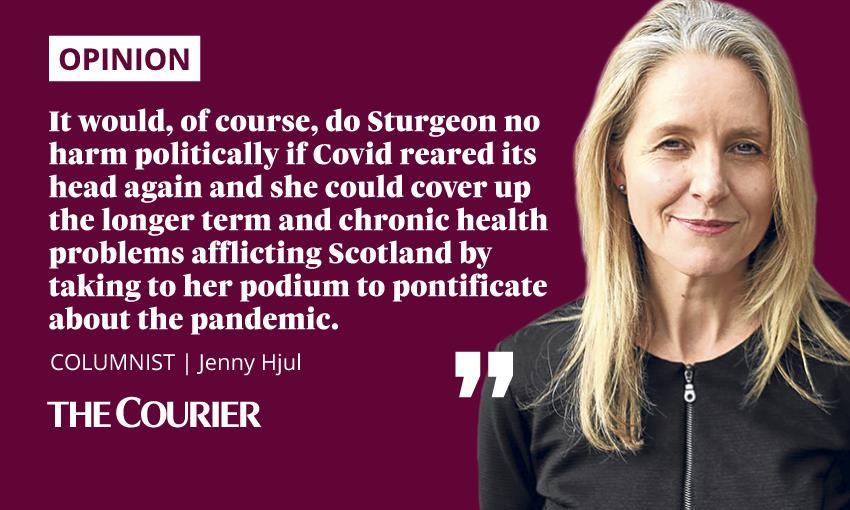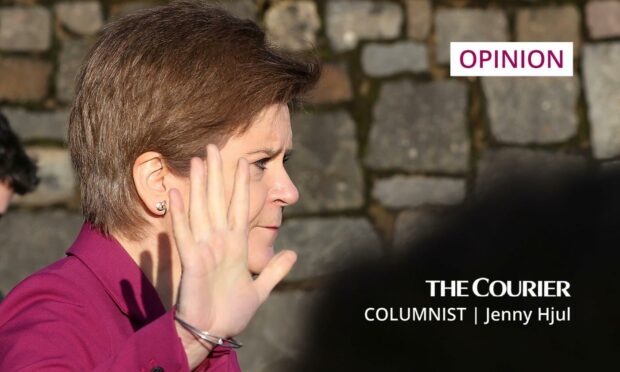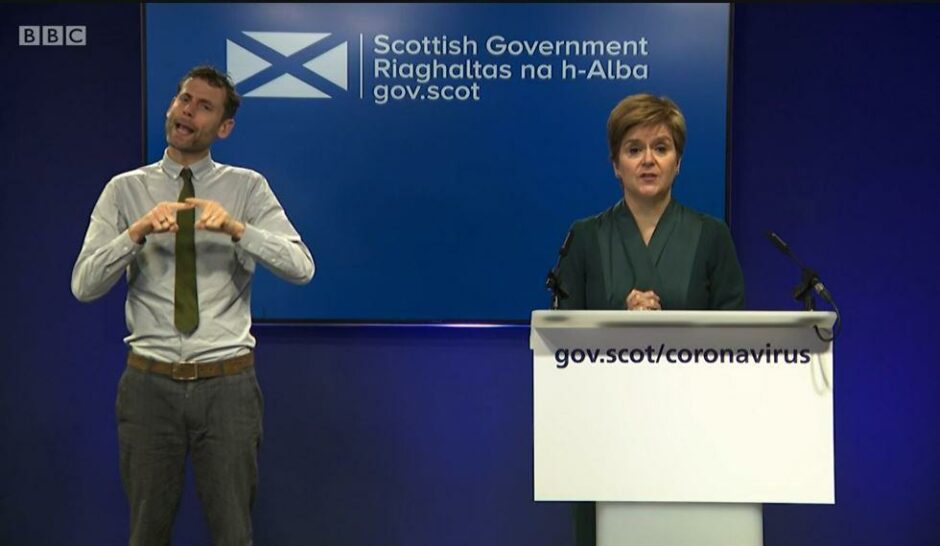It took Nicola Sturgeon about two days after the emergence of the new Covid mutant to issue her latest threat to close the borders between Scotland and England.
Even by the First Minister’s standards in grievance seeking that is good going.
That’s despite doctors in South Africa, where the Omicron strain of coronavirus was first detected, urging calm.
They say that while transmissions have risen sharply, hospitalisations and deaths have remained low.
Dr Angelique Coetzee, chair of the South African Medical Association, told Andrew Marr on Sunday: “What we are seeing clinically in South Africa – and remember I’m at the epicentre – it’s extremely mild.”
But what does a medic at the epicentre know?

Boris Johnson was the first to panic, putting most of southern Africa on a travel red list, and reintroducing some Covid restrictions in England, such as mask wearing in shops and on public transport.
In Scotland, Sturgeon, who has past form in using the pandemic to sow discord with the rest of the UK, was momentarily wrong-footed.
Face coverings are still mandatory in many public places, and in schools, north of the border so she had to come up with something else.
Past attempts at border blocking flopped
Threatening to block the borders is a tactic much beloved by Nationalist politicians because it stirs up the activists, inciting the nuttier elements to set up their own flag waving vigilante posts on the A1.
It is, however, unenforceable, not to mention illegal.
"We haven't admitted anyone"
Dr Angelique Coetzee, the South African doctor who first spotted the new Covid variant Omicron, told #Marr the patients seen so far have had "very mild symptoms" https://t.co/srGoUeub7M pic.twitter.com/1Hw6rInPnX
— BBC Politics (@BBCPolitics) November 29, 2021
Nicola Sturgeon tried it on during the second Covid wave last November, making it illegal for anyone to enter or leave Scotland without a valid reason.
But suggestions she had “sealed off” the border were a separatist fiction, as those of us who travelled freely in both directions can testify.
In June this year, she attempted to ban travel to Manchester but that gesture backfired too when the city’s mayor, Andy Burnham, pointed out that transmission rates in parts of Scotland were higher than in the north-west of England.
And her ploy of adopting harsher international travel rules than the rest of the UK was also a flop, after airline passengers bound for Scotland disembarked at English airports before heading home, Scot free, on the train.
New Covid variant, same old Nicola Sturgeon
This time round, she said she was refusing to rule out a new ban on travellers from England to Scotland.
But that was before six cases were discovered in Scotland on Sunday – rising to nine by Tuesday – and, suddenly, a ban in the other direction seemed more appropriate.
Against the backdrop of the SNP’s online party conference over the weekend, Sturgeon then demanded more furlough money from the Treasury and stricter quarantine measures, both of which were rejected by Downing Street.
Still desperate to be different, she resorted to imposing a half-hearted testing regime, which requires people to do lateral flow tests at home before going out, a recommendation rather than a regulation and likely to be ignored.
It would, of course, do Sturgeon no harm politically if Covid reared its head again and she could cover up the longer term and chronic health problems afflicting Scotland by taking to her podium to pontificate about the pandemic.
It is much easier to speak in general terms about the coronavirus menace, now mercifully receded thanks to the UK’s successful vaccination programme, than to deal in the specifics of NHS failings in Scotland.
Covid and empty indyref pledges are a convenient distraction
Sturgeon looks increasingly irritated, in television appearances and at the despatch box, when anyone dares probe too deeply into the shocking statistics on waiting lists and ambulance delays that are costing lives.
She has dodged demands, by Scottish Labour leader Anas Sarwar, to sack the board of NHS Greater Glasgow and Clyde, which has been accused of withholding details of deadly infections at the Queen Elizabeth University Hospital.
The Health Board has failed.
The Scottish Government oversight board has failed.
The First Minister continues to fail.
And families are paying the devastating price of these failures. https://t.co/glomcJQojH
— Anas Sarwar (@AnasSarwar) November 26, 2021
Police Scotland are now investigating the deaths of four children at the flagship unit but Scotland’s First Minister has refused to intervene.
She has also been reticent over the SNP’s privatisation of health services in Scotland, revealed by a newspaper this week, a policy sneaked in under the radar and completely at odds with the party’s hostility towards similar moves in England.
No one in Scotland will have been surprised to hear Sturgeon, in her closing address at the SNP conference, promising a second independence referendum in the spring.
This has become a regular refrain – putting a future date on a plebiscite which she knows is out of her grasp.
It prompts equal fury from foes inside the independence movement, who complain she is too cautious, and outside, who want the government to focus on Scotland’s more pressing problems.
But among the party faithful, she can be sure she will be forgiven her mounting domestic failures so long as she keeps their independence dreams alive.

